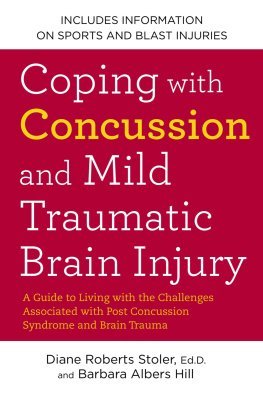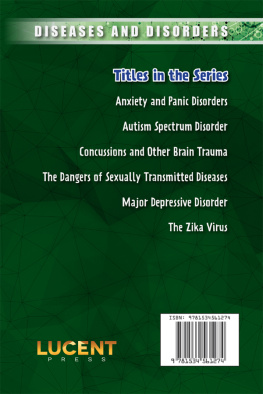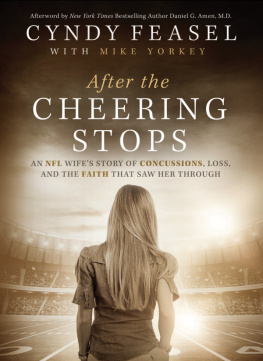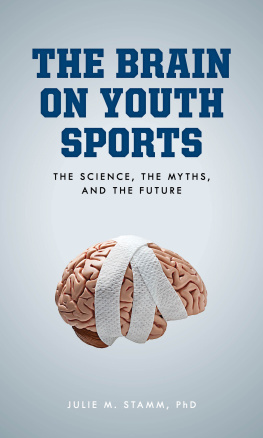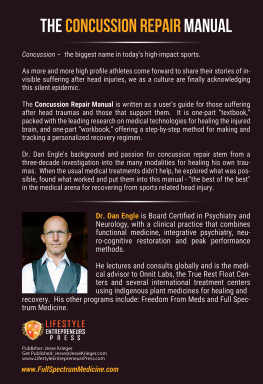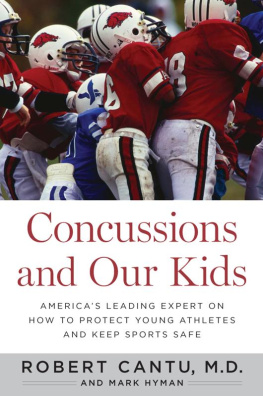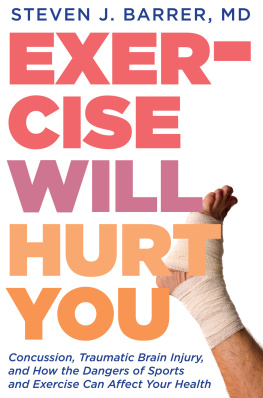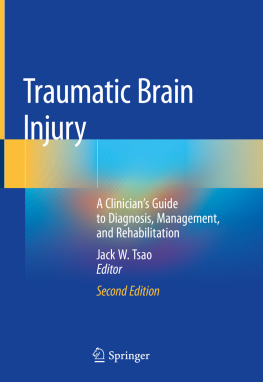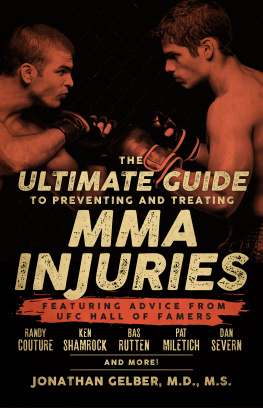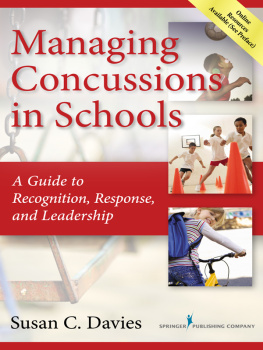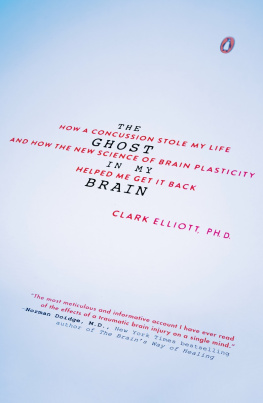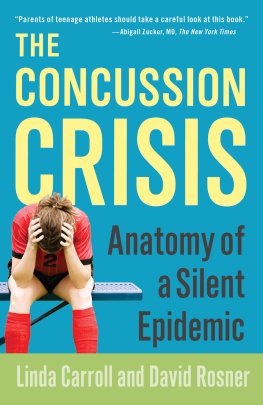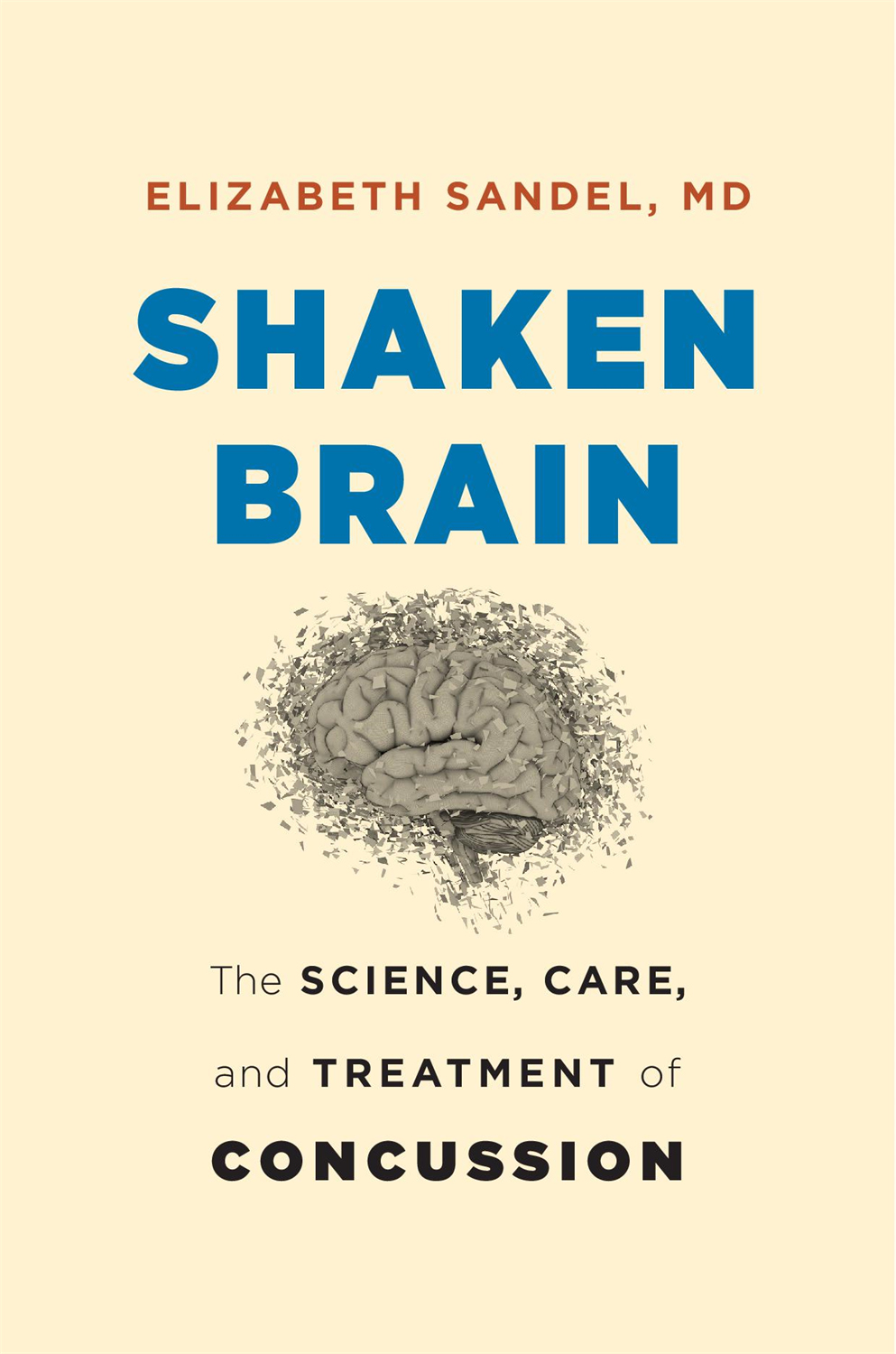Contents
Guide
Pagebreaks of the print version
SHAKEN
BRAIN

SCIENCE, CARE,
TREATMENT
CONCUSSION
Elizabeth Sandel, MD

Cambridge, Massachusetts
London, England
2020
Copyright 2020 by Elizabeth Sandel
ALL RIGHTS RESERVED
Cover design: Jill Breitbarth
Cover image: Getty Images
978-0-674-98741-8 (cloth)
978-0-674-24633-1 (EPUB)
978-0-674-24634-8 (MOBI)
978-0-674-24632-4 (PDF)
Many of the designations used by manufacturers and sellers to distinguish their products are claimed as trademarks. Where those designations appear in this book and Harvard University Press was aware of a trademark claim, then the designations have been printed in initial capital letters.
The Library of Congress has cataloged the printed edition as follows:
Names: Sandel, Elizabeth, author.
Title: Shaken brain : the science, care, and treatment of concussion / Elizabeth Sandel, MD.
Description: Cambridge, Massachusetts : Harvard University Press, 2020. | Includes bibliographical references and index.
Identifiers: LCCN 2019040007 (print) | LCCN 2019040008 (ebook)
Subjects: LCSH: BrainConcussion. | Brain damageTreatment. | Sports injuries.
Classification: LCC RC394.C7 S26 2020 (print) | LCC RC394.C7 (ebook) | DDC 616.8dc23
LC record available at https://lccn.loc.gov/2019040007
LC ebook record available at https://lccn.loc.gov/2019040008
In memory of my parents, George and Kay Sandel,
for giving me a love of language, learning, and teaching
for all those living with the effects of brain injury, and for their families
CONTENTS
ONE OF THE MOST BELOVED and memorable films of all time, the 1939 movie The Wizard of Oz, has become an enduring icon of popular culture. Its groundbreaking visuals, comedy, and music mark the film as a masterpiece. An early scene presents a troubling issue that advances the plot. A tornado hits a Kansas farmhouse and a window sash strikes the young heroine, Dorothy, who falls onto her bed, briefly unconscious. When her eyes open, the house is spinning, and then it makes a crash landing in the Land of Oz, where Dorothy and her dog, Toto, begin their adventures. As a child watching this movie, I thought Dorothy was dreaming, but as an adult I understand the fictional Dorothy has sustained a concussion.
In the 1930s and the decades following, films and other media have depicted concussions such as Dorothys as transient, just a brief jolt to the head. Slapstick comedians bonk heads, and falling anvils flatten cartoon characters, who bounce back instantly. Video games depict either inconsequential or lethal events from head trauma, without much in between. Victims who dont die see stars, but they quickly recover. These portrayals convey the messagestored in our consciousness as children and young adultsthat a concussion is a trivial matter with no lasting consequences.
As a physician, I have heard many concussion stories, but I have been especially struck by the number of serendipitous conversations I have had about concussion during the writing of this book with people who were not my patients. A college friend told me that she fell off a rocking horse at the age of 3. After the incident she remained in a coma for a day but fully recovered. Do you think the fall may lead to any problems later in life? she wondered. Another friend recounted that she had a sharp memory prior to having a concussion as a teenager but now needs to write things down to remember them. Could that have been because of the concussion? she asked. An acquaintance wondered what I thought about her nephews newly diagnosed seizure disorder. Might it be related to his several skateboard accidents? A woman I encountered while walking my familys French bulldog struck up a conversation with me about her brother-in-law. Could his dementia be related to the multiple concussions he experienced as a linebacker on his high school football team, like some of the NFL players?
A focus in the media on sports concussion controversies and the accelerating pace of brain injury research has brought concussion into public view and also likely increased the rate of concussion diagnoses. Yet while this attention has heightened awareness of public health issues and risks for young athletes, the explosion of information has also created more questions than answers.
Sports medicine physician Michael Collins and his colleagues at the University of Pittsburgh conducted a Harris Poll survey in 2015 to determine the extent of peoples knowledge about concussion. They found that nine in ten Americans could not define a concussion when given five options. Almost half of those surveyed were unaware that not all concussions happen during contact sports activities. Only about 30 percent recognized that a concussion does not require a blow to the head, or that concussions can be treated. About one-quarter feared their life would change forever if they had a concussion. Only about half of those surveyed had confidence that coaches and school personnel had sufficient concussion education.
I have written this book to provide accessible, accurate, and up-to-date information. I answer typical questions about concussion science and concussion treatment within the limits of current and always-evolving knowledge of the human brain. Whether you have personally suffered a concussion or are a friend or family member of a concussion patient, a medical or care professional, or a coach or caseworker, this book will offer answers.
My Journey
My experience with concussion began in 1985, after my residency in physical medicine and rehabilitation (PM&R) and a fellowship in brain injury medicine. In my inpatient practice, I cared for patients in acute-care hospitals, rehabilitation hospitals, and skilled nursing facilities. These patients had survived the most severe trauma to their brains and bodies. They included people in coma or living with other disorders of consciousness, as well as those who had emerged from coma with severe disabilities. We resuscitated and stabilized patients, treated them in trauma and rehabilitation hospitals, and eventually sent them home, sometimes to return to school or work. Many had visible, permanent effects of trauma and physical and cognitive impairments that clearly limited their function and quality of life.
In contrast, in my outpatient practice, I encountered another group of patients who had experienced one or more concussions. While these patients had non-life-threatening injuries, they improved slowly, and in some cases they never recovered completely. These less-than-ideal outcomes occurred despite the fact that their injuries fell into the so-called mild category by clinical measures and led them and their familiesand their doctorsto expect a full recovery. Their injuries could not be located with X-rays, computerized tomography (CT) scans, or laboratory tests, nor could these injuries be confirmed through a physical examination. Many patients experienced very severe symptomspounding headaches, disorienting vertigo (a spinning sensation) and balance problems, debilitating insomnia, tinnitus (ringing or buzzing in the ears), hypersensitivity to light and sound, blurred vision, irritability, and difficulty concentrating, reading, and remembering. Some of these symptoms continued for months or even years, and these patients often had difficulty organizing their days and completing tasks, let alone enjoying life in any way.


